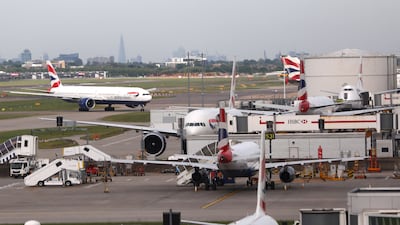About 15,000 “ghost flights” left British airports during the first 18 months of the Covid-19 pandemic, figures have shown.
Heathrow topped the list with 4,910 ghost flights, defined as those without passengers or fewer than 10 per cent of passenger capacity, between March 2020 and September 2021.
Manchester Airport came second for ghost flights while Gatwick was third on the list.
The practice has been heavily criticised by environmental campaigners who say the carbon emitted during flights cannot be justified if the journey is unnecessary.
Ghost flights took off from all 32 airports listed on the newly released data. The figures include flights which were operated mainly to transport cargo or repatriate Britons stranded overseas.
In response to a parliamentary question, figures released by Robert Courts, the UK's Aviation Minister, showed an average of 760 empty planes left the UK each month during the period.

The actual numbers may be slightly higher because the data covered only international departures and not domestic flights.
Heathrow endured its worst financial year in 2021 and served its lowest number of passengers in about 50 years.
Aviation rules stipulate that airlines can lose valuable slots if they are not using at least 80 per cent of them.
However, the rules were suspended after the coronavirus crisis hit in spring 2020. But despite the relaxation, airlines flew 14,472 empty planes out of the UK.
“Flights may operate with a low number of passengers for a range of reasons,” Mr Courts said.
“Since the onset of the pandemic, the government has provided alleviation from the normal slot regulations. This means that airlines have not been required to operate empty or almost empty flights solely to retain their historic slots rights.”
Mr Courts released the data after Labour MP Alex Sobel, chairman of the net zero all-parliamentary group, raised the issue.
“To really tackle the climate emergency, we need to ensure that our aviation sector is as efficient as it can be with its carbon output,” Mr Sobel said.
Heathrow chief executive John Holland-Kaye said flights with low passenger numbers were often used to transport cargo.
“If you were flying PPE [personal protective equipment] from China or UK exports into the US while those markets were closed [to leisure travel], you would fly them on a passenger plane and you might only have a couple of passengers on board,” he told the PA news agency.
“Given how tight finances are, nobody is flying a plane unless it is economically viable. This is actually about keeping the UK supply chain going while borders are closed for passengers.”
British Airways and Virgin Atlantic insisted they have not operated “ghost flights” to retain slots during the pandemic.
A Virgin Atlantic spokeswoman said its low-occupancy flights “supported the global movement of people, including returning foreign citizens and repatriated UK citizens, as well as keeping global supply chains running by moving vital cargo, including medical supplies and PPE”.









































